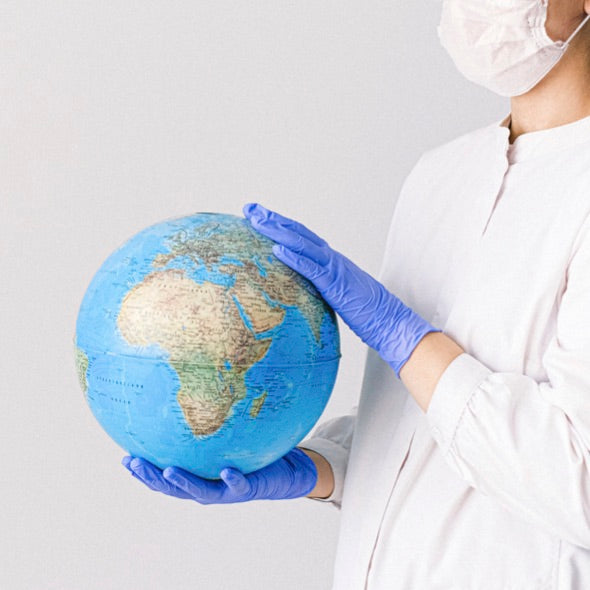Our understanding of the novel coronavirus is constantly changing as information and research develop.
According to an article published in the New York Times this past weekend, scientists from 32 countries believe that “the coronavirus is borne through air and can infect people when inhaled.” The World Health Organization (WHO) previously held that airborne transmission of the virus was only possible after medical procedures producing droplets smaller than 5 microns. However, they recently changed their position, stating yesterday: "Transmission of the virus by aerosols may have been responsible for outbreaks of COVID-19 reported in some closed settings" (WHO). If COVID-19 is transmitted via aerosols, HEPA filters may help capture the virus.
Here at Wynd, we continue to monitor the news and science carefully. While we are still learning about how coronavirus can be transmitted, according to the EPA: “When used along with other best practices recommended by the CDC, operating an air cleaner can be part of a plan to protect yourself and your family.”
The Link Between Pollution and Coronavirus Spread
Many studies released over the past few months have noted the correlation between pollution and the increased effects of coronavirus. An important study released by Harvard’s T.H. Chan School of Public Health found that slight increases in pollution exposure could have serious coronavirus-related consequences. According to the study, “long-term exposure to air pollution increases vulnerability to experiencing the most severe COVID-19 outcomes.” (New York Times). The difference of one unit of fine particulate pollution in the air may make a person 15% more susceptible to coronavirus complications.

In a different study, German scientists analyzed deaths related to COVID-19 in 66 regions in Europe. Results demonstrate that 78% of all COVID-related fatalities centered in five regions in north Italy and central Spain, areas which had the highest concentration of the pollutant nitrogen oxide. Nitrogen oxide can enter the atmosphere from fossil fuel combustion of vehicles and power plants and pollute the air.
The European Public Health Alliance notes a strong correlation between air pollution and COVID-19, and its negative impact on the immune system. Air pollution can weaken your immune system, making it harder for the body to fight off the novel coronavirus once infected. With evidence indicating that people with compromised immune systems may be at greater risk of complications from COVID-19, breathing clean air becomes even more important to those populations.
How the Wynd Plus Air Purifier Helps:
Air purifiers can remove pollution particulates released by factories, traffic, and other industrial sources. Using a portable air purifier (like the Wynd Plus) helps create a bubble of clean air around you to support your health. The Wynd Plus weighs less than a pound so you can bring it with you anywhere you go. It has a medical-grade air filter, capturing 99% of particles over 0.3 microns, including aerosols and industrial pollution particulates, to increase your air flow.

Indoor Air Pollution Is Increasing During Lockdown
Recent studies have mainly focused on associations between outdoor air pollution and the novel coronavirus. Yet oftentimes more pollutants are concentrated inside our buildings than outside of them (Scientific American). COVID-19 has changed the way we live, and people are now spending significantly more time indoors. More time indoors affects the quality of the air we breathe.
Increased indoor activity exposes individuals to higher levels of PM2.5. Scientists at King’s College London estimate that spending an extra hour each day cooking can increase exposure to fine particulate matter by 19%. “Indoor pollution from gas stoves can reach levels that would be illegal outdoors” (Scientific American). When these particles react with airborne compounds they oftentimes release well-known toxic compounds into the air.

According to the EPA, individuals that may be particularly susceptible to effects of indoor air contaminants include, but are not limited to, people with:
- Asthma
- Respiratory diseases
- Suppressed immune systems (due to radiation, chemotherapy, or disease)
- Heart disease
These individuals are also seen as higher risk to the adverse effects of coronavirus, and are likely spending even more time at home.
How the Wynd Max Air Purifier Helps:
Air purifiers trap particulates that contribute to air pollution in your home. The Wynd Max can clean over 1,000 square feet of space in 30 minutes; its HEPA filter utilizes 3 effective layers to kill germs and remove particulates and gases from the air. An air purifying tracker like the Wynd Halo may also be helpful to noticing changes in your air as you spend more time at home. By removing harmful indoor particulates, you can support your family’s immune system health during this time.

Air Purifiers Make a Difference
We’re still learning about COVID-19. Wearing masks, frequently washing your hands, and maintaining social distancing are all important ways to protect your family. The WHO also recommends "ensuring good ventilation in indoor settings, including homes and offices." With air purifiers and air quality trackers, you can monitor and improve the air in your home and invest in your family’s health and wellbeing, too.

